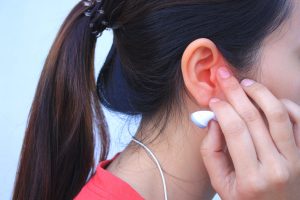How Can Teens Avoid Noise Induced Hearing Loss
Be honest. When was the last time you saw a young person on the street, or anywhere, without earbuds in their ears? Whether it’s walking down the street, jogging, on their way to work, or just relaxing, they are distracted by the noise in their ears. As technology improves, so does noise induced hearing loss. It’s just a fact, which leads us to the question: how can teens avoid noise induced hearing loss.
Decibel Settings
Sound is measured in decibels (dB). The higher the decibels, the more likely you are to damage your hearing over time. Anything at or above 85 dB can be just that, damaging.
damage your hearing over time. Anything at or above 85 dB can be just that, damaging.
A study done in 2020 told us that 24% of young people between ages 12 and 35 regularly listen to sound at unsafe levels. Music played in an earbud or headphones is typically 94-110 dB.
In 2022 the World Health Organization issued standards to aid in reducing hearing loss in this age group. They recommended setting the output in a device to a default setting of 70-85 dB. Parents can change the default setting on their kid’s devices to this safer level.
Not Just An “Old Person” Issue
Most of us have always thought of hearing loss as something you expect in an older person. You see seniors wearing hearing aids and you understand why. You don’t necessarily think of a young person having any hearing problems, but many do.
In addition to listening to devices too loud, teens also frequent concerts, noisy outdoor events, and sporting venues which can affect their hearing. Another study of young people aged 6 through 19 discovered that 5.2 million of them have suffered permanent hearing damage.
The culprit is the decibel level and how long you listen. The louder the noise, the quicker the damage occurs.
Why Noise Induced Hearing Loss Is Important In OKC and Tulsa
In young children, even a small amount of hearing loss can affect their communication, speech development, comprehension, plus classroom learning and socialization. When you can’t hear well, it affects everything in your life.
It is a problem that doesn’t get better without some intervention.
As parents, there are many ways to help prevent noise induced hearing loss or help improve your child’s hearing.
- Teach your children about the causes of NIHL.
- Teach them safe practices and how to turn down the volume of their devices.
- You change the volume control on devices.
- Explain that they should move away from loud amplifiers, fireworks, or construction work.
- Encourage them to wear earplugs at loud events.
- Encourage them to use the internet to find out the decibel levels of certain noises they hear regularly. This may keep them interested in preventing noise induced hearing loss.
Contact Hearts for Hearing for a hearing examination if your child is exhibiting any hearing loss, if they increase the sound on the TV, or you need to repeat instructions or talk louder to get their attention.
